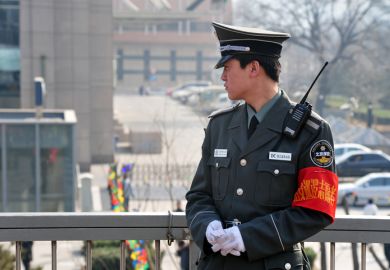Universities must do more to protect Chinese students who speak out against their government while they are overseas, as some find themselves subject to a “sinister pattern” of surveillance and harassment from the Beijing authorities, according to new research from Amnesty International.
Students described being photographed and followed at protests in their host towns and cities, while their families in China have been targeted and threatened by police in connection with their activism overseas.
In a new report, On my Campus, I am Afraid, Amnesty International documents the experiences of 32 Chinese students in Europe and the US. China is one of the most significant countries of origin for international students, with official figures showing that more than 700,000 students went abroad in 2019.
Researchers reveal a pattern of transnational repression that has created a “climate of fear” on university campuses, with students afraid to participate in parts of academic life and work, including censoring themselves during academic discussions, avoiding “sensitive” topics and declining careers in academia.
In particular, students who had taken part in public activism against the Chinese government overseas spoke about the repercussions of doing so, with many believing they were being closely watched by authorities.
One student featured in the report discusses attending a Tiananmen Square commemoration event, only to receive a phone call from her father hours later, saying he had been visited by Chinese authorities.
Security officials told him to warn his daughter not to “attend any events that may harm China’s reputation in the world”, she said. The student had not used her name at the protest or posted online about attending.
Amnesty found evidence that Chinese authorities actively monitor the online activity of overseas students and diaspora community members. Meanwhile, China’s “great firewall”, which limits communication platforms that can be used in the country, puts overseas students at greater risk as state-approved platforms are the only way of staying in touch with their families at home.
Another student told researchers that the government is purposefully creating an atmosphere of fear, with students afraid that their peers may report them to Chinese authorities if they show any signs of dissent. “They can’t monitor everything and everyone, so their process is to create this stressful environment to prevent people from joining movements, from participating in events,” he said.
For international students from China, Amnesty says, “the decision to exercise their rights to freedom of expression, association and peaceful assembly while studying overseas is fraught with the fear of drawing repercussions from authorities in China”.
Many of the students interviewed said they felt both universities and governments in their host countries were either unaware of or unwilling to respond to their concerns about transnational repression.
Amnesty outlines a series of recommendations for institutions to better respond to the issues raised in the report, including introducing mechanisms to protect students and staff against intimidation and harassment, and implementing systems to monitor threats from third parties.
“It’s obvious the Chinese authorities are trying to replicate the climate of fear which gags people in China and Hong Kong, making students terrified of how they are being perceived and suspicious of their fellow students,” said Sacha Deshmukh, Amnesty International UK’s chief executive.
“The government and UK universities need to understand the dangerous realities Chinese students face from China’s transnational repression, making it clear that they’ll prioritise Chinese and Hong Kong students’ safety and freedoms.”
Register to continue
Why register?
- Registration is free and only takes a moment
- Once registered, you can read 3 articles a month
- Sign up for our newsletter
Subscribe
Or subscribe for unlimited access to:
- Unlimited access to news, views, insights & reviews
- Digital editions
- Digital access to THE’s university and college rankings analysis
Already registered or a current subscriber? Login








